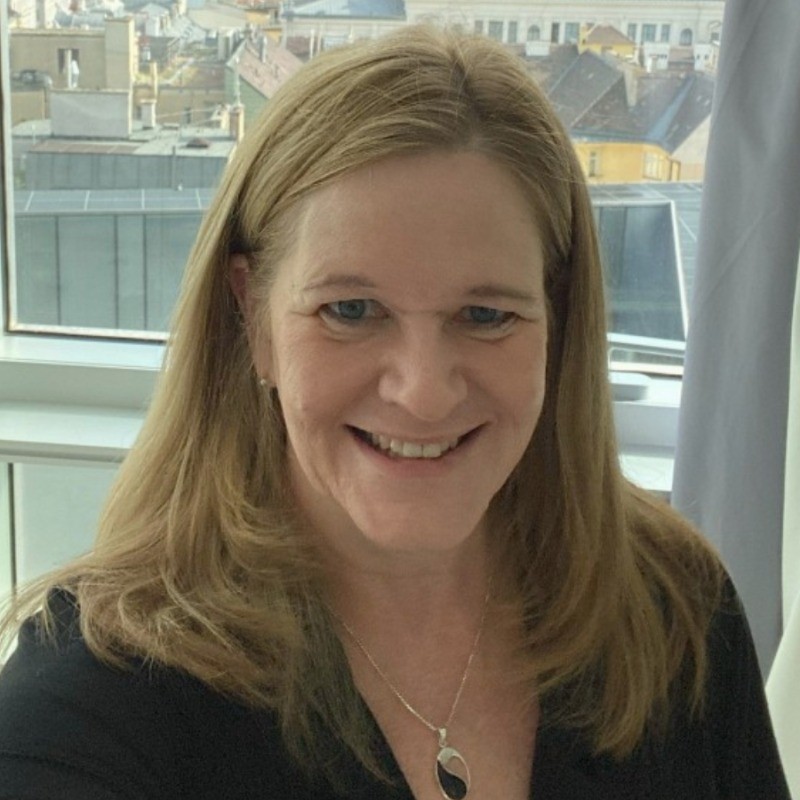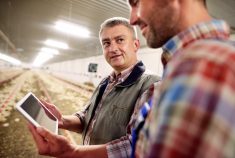All kinds of professionals offer farmers advice. Think of accountants, agronomists, bankers, business planners, fitness coaches, marketing experts, soil scientists, succession planners, vets. It can be overwhelming.
Even so, when you need someone to help you pull all the pieces of your business and personal life into one big picture, you might be looking for a mentor.
Why? Because the right mentor can help you set personal goals and make sure you’re travelling in the right direction to achieve them. A mentor won’t take the place of the professionals in that long list above, but a well-chosen mentor can help you figure out where you want to go and then decide exactly which professionals you’ll need on that journey.
Read Also

How scientists are using DNA and climate data to breed crops of the future
A method for forecasting how crops will perform in different environments so that plant breeders can quickly select the best parents for new, climate-resilient varieties.
Working with a mentor means opening yourself up to share the personal aspects of your life. It means verbalizing your hopes and dreams. It also means knowing the relationships between mentees and mentors must be strong, but delicate enough to allow mentees to share uncomfortable truths and get ready to make changes to improve their businesses and lives.
A good mentor/mentee relationship is a mysterious alchemy of emotion and information. Brenda Schoepp has built a reputation as a professional who can harness that alchemy and help her mentees identify and achieve their goals.
Through her years working with mentees, Schoepp has given serious thought to how mentorships work, including in a farm context, and what mentors and mentees need to bring to the table to make these relationships rewarding for everyone involved.
READ MORE: So, you want to be a mentor?
A good mentor
For Schoepp, mentoring is about mutual respect and trust. A skilled mentor will give their mentee the courage to open up and be vulnerable. When the mentor/mentee relationship is working, mentees often share personal things with Schoepp that they’ve never told anyone before. “I hear it all,” Schoepp says. Some of the secrets they reveal are difficult to hear, but, Schoepp says, “I’m privileged to hear it, because it needs to be said.”
Listening is a mentor’s biggest job. “You’re listening to people, and you’re walking through something beside them,” Schoepp says. “Mentors don’t just pay attention to what their mentees say. You’re also listening to what’s not being said.”
But don’t be fooled by this vision of a quiet mentor, listening thoughtfully.
“A mentor should rattle you, in a big way,” Schoepp says. “Rattle you to a place where you’re almost uncomfortable.”
The mentoring process
Schoepp’s mentees typically seek her out when they realize the way they’re living their life isn’t sustainable. The fact that they’ve come to her, instead of making an appointment with an accountant or a succession planner, gives Schoepp an indication the mentee is looking for a life change. “It takes a lot of courage on their part to initiate change,” Schoepp says.
Once they’ve opened the door to the mentor/mentee relationship, Schoepp works with mentees to help them find their own solutions. “Everyone has skills and gifts and talents and uniqueness. We (mentors) foster that, so they can make the decisions that they have to make.”
Schoepp doesn’t provide advice. Instead, she listens, and she gives her mentees space, until “they come to the place that they need to come to,” and realize what they need to have happen in their lives.
Once Schoepp’s mentees set their goals, she says, “they’re ready to call in the experts to lay that framework out.” The mentor/mentee relationship drives the change. Then coaches, accountants and other professionals come in to make the change happen. “I open the gates,” Schoepp says. “But behind me is a whole pen, or a whole field of experts.”
There’s no fixed timeline for Schoepp’s process. Some mentees work through the process quickly and are ready to implement change. “Some of them are with me their whole lives,” she says. Schoepp works to meet her mentees where they’re at and help them gain the courage to make the changes they need to make. “Sometimes we see ourselves as not capable, or not worthy,” she says. Schoepp provides support and acceptance to build up mentees in that position.
Does it work? Quite often. “A lot of my mentees are very, very wealthy now, because they’re comfortable with themselves and they’re comfortable with their decisions,” Schoepp says. It might be rewarding, but it’s not easy. It takes a lot of work on both sides. “That’s why there’s so few mentorship programs,” Schoepp says.
If you know where you want to go, but just need some assistance in getting there, Schoepp would say that you need a “coach.” If you know you need a transition, but you’re not quite sure what that transition looks like, you probably want a mentor.
Schoepp’s mentees are at a point where they’re open to making changes in their lives. “The majority of my work is with young people,” Schoepp says. “In your 30s you really start to question things. It’s just part of life.”
A strong mentor/mentee relationship
In 2011, Jeff Braisher was a 30-year-old with an entrepreneurial mindset, working on his family ranch, Kingsclere Ranch, in the Columbia Valley in B.C. Braisher was working on an on-farm data-collection and analysis project when he realized he could use some help to take his idea to the next level.
“I recognized the need to reach out to people who understood more than I do,” Braisher says. He applied to the Canadian Cattle Young Leaders (CYL) program and was accepted as a mentee in 2011, the program’s second year of operation.
At that time, Braisher needed two things. He needed to know if the project he was working on was valuable, and he needed to meet more people in the ag industry. The CYL program matched him with Schoepp so he could draw on her in-depth knowledge of the beef industry.
The mentor/mentee match worked for both Braisher and Schoepp. “Everything just aligned,” Braisher says. “I was willing and open and actively looking to figure out solutions to some of the challenges I was facing.”
During their time in the program, Schoepp helped Braisher address his challenges and solve problems he didn’t know he had. He remembers attending a conference with Schoepp, where she introduced him to several industry leaders. That night, he says, “I came back to the hotel and said to my wife, ‘Everyone’s going to know I’m a fraud.’” He laughs about it now, but at the time it was an intimidating experience.
Before the program, Braisher hadn’t realized the importance of learning to network. Schoepp helped him build networking skills and learn to connect with others in the industry.
Braisher’s experience as a mentee exceeded his expectations. Looking back, 12 years later, now that he’s ranching, running a business and raising a family, he is astounded by the amount of time Schoepp put into the mentorship. “I don’t how she did it, in terms of fitting it in.”
Finding the right mentor
Schoepp is fond of an old saying: “When the student is ready, the teacher will appear.”
Some of her mentees have heard her speaking at conferences and actively sought her out. Others find her in more accidental ways. Once, she says, she was approached on the street by someone with a medical profession.
If you’re looking for a mentor, start by exploring programs that offer formally structured mentor/mentee relationships. Some of these programs offer funding to help you travel to meet with your mentee or attend conferences or workshops. Before you apply, make sure the structure of the program suits your needs, and that you have enough time to make the most of the process.
If you’re looking for a mentor outside of a program, consider your needs. But be cautious. Some advisors are mainly selling a product and the process becomes mostly about how you should use it more.
Schoepp and Braisher still keep in touch, by the way, though in a slightly different capacity. Now Braisher has a long list of people he can approach for advice. “My breadth of connections and my friends within the industry have gotten far more significant,” he says.
Braisher knows Schoepp’s efforts made the mentorship successful. But he also contributed by being ready to learn and grow. “It takes two… it’ll only go as far as the lowest common denominator,” Braisher says.
So, you want to be a mentor?
Do you have what it takes to be a mentor? It’s going to take a lot of knowledge about your area of expertise. But you’ll also need to know yourself.
“You have to understand yourself very, very well before you mentor,” says Brenda Schoepp, a Vancouver Island-based mentor, speaker and writer. You’ll also need a high level of emotional intelligence and be able to read other people and set yourself aside while you focus your attention on your mentee’s situation.
Not everyone has what it takes to be a good mentor. “If you don’t have a lot of patience and emotional intelligence, but you’re very open to the world around you, you might be a great person, but not a great mentor,” Schoepp says.
Schoepp came to her role as a mentor in a non-traditional way. She began by gaining experience in several areas of the Canadian cattle business. “I did a lot of things that were not done by women in my day.” A lot of her industry education, she says, came because she was curious, and when she had questions, she asked them. “That allowed me to take in information.”
Schoepp started mentoring in the context of the Canadian livestock industry. She liked mentoring and was good at it. Now, she says, “I’ve been exposed to so many types of agriculture and I’ve been on a wide variety of farms.” She works with people in agriculture around the world, but also with people working in all kinds of other industries. This wasn’t a path she planned, she says. “I just walked through every door that was open.”
If someone asks you to become their mentor, consider your own skills first. If you don’t have the time and patience for the ebb and flow of the mentorship process, you might find yourself telling mentees what to do, rather than letting them reach their own conclusions. “That’s not the idea behind mentorship,” Schoepp says.
If you’re considering becoming a mentor, know what your potential mentee expects. Ask, “What does that look like for you?” Make sure you have the time available, and that your schedule is flexible.
Some potential mentees might be searching for help redesigning their lives. Others might simply want to be more connected to the industry as a whole, or the community, or their social circle, Schoepp says.
Schoepp sees mentorship as “an act of servitude.” Being a good mentor takes a lot of time, and a lot of emotional strength. Despite the time requirement and the emotional toll, Schoepp finds great value in mentoring. “It’s a two-way street,” she says. Mentors can learn from their mentees and from the dialogue that takes place during the pairing. It is rewarding to know that someone trusts you to listen to their goals and dreams and help them find their way. Says Schoepp,“Whenever I’m asked to do this, I find it an honour.”
















